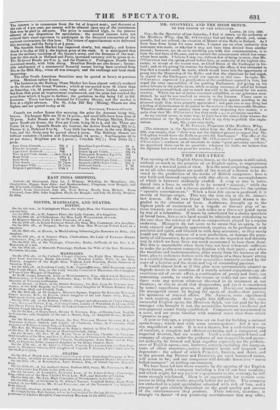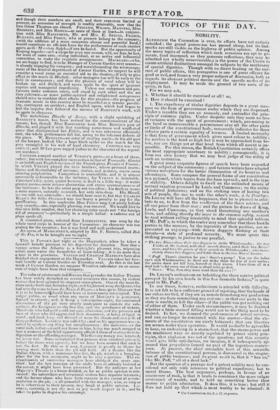THE THEATRES.
THE opening of the English Opera. house, as the Lyceum is still called, without so nitich as the promise of no English opera, is unpropitious enough in u musical point of view. It is the more surprising, inasmuch as on all sides complaints are made of the want of it theatre to be de- voted to the production of the works of British composers : here is one built and licensed expressly with this object, the accomplishment of which is however studiously evaded. A song or two is intro- duced into a farce to entitle it to be termed " tnusical; " while the addition of a duet and a chorus qualifies a melodrama for the epithet " operatic entertainment." When a bond fide opera is produced, it is mostly of foreign origin. This was the case too at the St. James's last season. At the two Great Theatres, the lyrical drama is de- graded to the situation of farce. Audiences, wrought up to the highest pitch of excitement by a tragedy or five-act play of 'se- rious interest, are treated with such trifles as a three-act grand opera by way of a relaxation. If music be substituted for a showy spectacle or broad farce, STRAUSS'S band would be infinitely more stimulating to the ears than the noisiest of modern compositions played by a regular orchestra. Managers do not seem to be aware that an opera, to be truly enjoyed and properly appreciated, requires to be performed with precision and spirit, and listened to with deep attention ; or they surely would not risk the success of a new production, or damage the popu- larity of old favourites, by presenting them in the imperfect arid slovenly way in which we have been too much accustomed to hear them done. But this is unavoidable when there have not been rehearsals sufficient to make the performers commonly familiar with their parts ; and when the vocalists and instrumentalists, alike weary from the lateness of the hour, play to audiences listless with the fatigue of a three hours' sitting in a crowded theatre, or with their sympathies intensely excited by the woes of a heroine mid the strain and tug of contending passions. It would almost look as if this plan were systematically adopted to degrade music to the condition of a merely sensual enjoyment—an ad- ventitious aid of scenic effect, a combination of pretty and lively but unmeaning sounds, to startle the senses or tickle the ears withal—if there were any system whatever observed in its treatment tit our theatres ; or else to avoid that disagreeable, and (us it is considered by some) superfluous process, of payment. .11AultEADY commenced his managerial career by buying the opera of Amilie—thus proving his ignorance of musical affairs. Mr. Aitsto.o, more experienced in such matters, could have taught him difkrently. As the most successful English opera, the lifountoin Sylph, was not paid for by the manager who -brought it out, the association between excellence and non-payment seems firmly established. Composers are accustomed to a score, and are more familiar with musical notes than those which "promise to pay." A year or two ago, a project was set on foot for building a national opera-house ; which met with some encouragement : but it was on too magnificent a scale. It is not a theatre, but a well-trained corps of vocalists, a complete and efficient orchestra, and a competent and impartial director, that are wanted. Until a well-organized band and company of singers, under the guidance of one respousilde and power- ful authority, be formed and kept together expressly for the perform- ance of English opera—not, however, entirely excluding the composi- tions of other countries—native dramatic music will languish and degenerate : the school of which PURCELL, SHIELD, and ARNE, and in the present day BISHOP and BARNETT, are most honoured names, will cease to be ; and our composers will dwindle down into " metre ballad-mongers" or rattling ear-stunners.
We have been led into these remarks by the opening of the English Opera.house, with a company including a few of our best vocalists; and which might, for any present engagements to the contrary, be still more strongly reinforced. Ikre is an opportunity for modern coin- posers to bring their works properly before the public. 'flue company are embarked in a joint speculation attended with risk of loss, and a prospect of gain entirely dependent on the good quality and success
of the entertainments they produce. Their interest, therefore, is strongly iu favour 4 any promising entertainment that may offer;
and though their numbers are small, and their resources limited at present, an accession of strength is readily attainable now that the two Great Theatres are closed. PHILLIPS, WILSON, MANVERS, Miss SHIRREFF, and Miss ROMER—or some of them at least—in conjunc- tion with Miss RAINFORTII, Mr. and Mrs. E. SEGUIN, FRASER, BURNETT, and Miss Boost, who at present belong to the company, (with the addition of a more numerous chores and powerful band,) would constitute an efficient force for the performance of such another opera as ths Morntain Sylph—if one be found. But the opportunity of keeping together rush a corps for even one season, will, we fear, be lost, for want of some ente. arising individual, or an active and influential committee, to make the requisite arrangements. MaceeaDY—who, we are happy to find, is to be Manager of Covent Garden next season— is already engaging his company; and notwithstanding the mismanage. ment of the musical department of Covent Garden, we suspect he will consider a vocal corps an essential aid to the theatre—if only to give effect to the music in Macbeth : other managers too will be early in the
field in consequence ; and thus the pbulanx of vocal talent will be broken up and divided, and opera again be the sport of ignorant caprice and managerial expediency. Unless our composers and per. formers make common cause, and stand by each other and the art
they cultivate—or some public-spirited and enlightened entrepreneur should arise to combine their efforts for this purpose—the progress of dramatic music in this country must be regarded as a remote possibi- lity, contingent on accident ; and English opera, which had begun to feel the impulse that followed the success of BARNETT'S work, will be again in abeyance. The melodrama Blanche of Jersey, with a slight sprinkling of BARNETT'S music, has been revived for the commencement of the season; but, though Miss Rats:roma' took Miss ROMER'S part of Blanche, and played it with that touching earnestness and unaffected grace that distinguished her Fidelio, and it was otherwise efficiently
east, the whole performance fell flat, owing to the inherent defects of
the piece. W. BENNETT—an actor of sterling merit—in his old part of the lawyer, looked like a huge black spider on the watch for the prey entangled in his web of legal chicanery. COMPTON was very carnival and AVIAN gave tugged pathos to the character of the repent- ant murderer.
COMPTON essayed another of VERNET'S parts—or a brace of them, rather ; but with less complete success than in that of nanquille. Gemini is an indifferent English version of the French piece Prosper et Vincent ; in which VERNET played the twin brothers, whose personal resem- blance and dissimilarity of costume, station, und manner, create some
amusing perplexities. Comparison is unavoidable, and it is almost
necessarily unfavourable to the imitator; for ViatarT is inimitable. CoMrroN'S dry, quiet, quaint humour, is droll in a little way : it wants greater gusto—more intense abstraction and entire unconsciousness of the ludicrous : to lets the artist peep out too often ; his drollery seems a mere manner, naturally assumed, but only skin.deep. His Afore, we are told. was admirable : we should have seen it, but that CHARLES REAN's Sir Giles Orerreach was too -heavy a penalty to pay for the gratilleation. In this vaudeville Miss POOLE sang two pretty ballads
very sweetly—one, especially pleasing, was encored. We would hint to this nice little vocalist, that her charming voice needs not "the foreign aid of ornament"—particularly in a simple ballad : a cadence out of place spoils all.
A concerted piece, selected from LINDPAINTFR. was sung by the whole vocal corps in honour of the Coronation : its character was too psalmy for the occasion ; but it was brief and well performed. An opera of Maasenxett's, adapted by Mr. F. Roattat, called Rob of the Fen, is to be brought out tonight.



























 Previous page
Previous page